Warhammer Quest: Darkwater is available to pre-order on Saturday this week. We’ve covered all the rules for you already, but who better to tell us about some of the decisions behind them than someone from Warhammer Design Studio? John was part of the team that worked on Warhammer Quest: Blackstone Fortress and Cursed City, and has played every single other edition exhaustively, so he’s well placed to wax lyrical to us about the latest reincarnation of the beloved cooperative dungeon crawler.
John: Warhammer Quest: Darkwater is the latest rendition of one of the most beloved games in Warhammer’s storied history. While more modern incarnations – Silver Tower, Shadows over Hammerhal, Blackstone Fortress, and Cursed City – all used more or less the same system with a few updates and modifications between editions, Darkwater takes a whole new approach, with a view to making the game more streamlined and accessible to new players, while still challenging and replayable enough to appeal to veterans. Here I’ll take you through some of the major changes, and talk a little bit about the intent behind their implementation.
Tiles to book
Probably the biggest and most obvious visual change to Warhammer Quest is that it uses a big, hardback, lay-flat map book that contains a series of maps to show the battlefield, rather than a set of tiles, or a progression of tiles placed during play. This promotes swift set ups, narratively themed maps, contained play areas, and even tuneable difficulties and other fun mechanics.
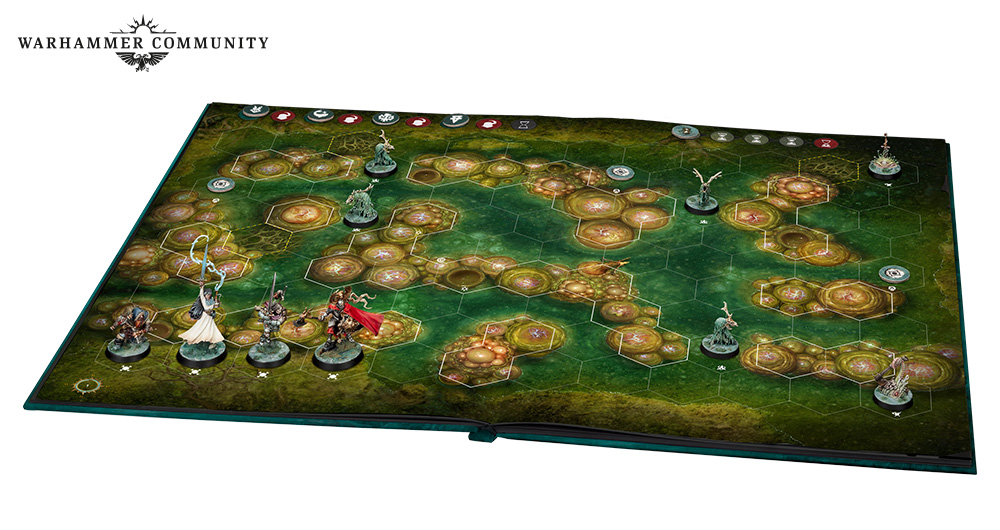
Swift set up
Turning to a page is the majority of the set-up time in Darkwater. This means that once you decide what path to take in the Jade Abbey (more on that later) you are up and running within a few minutes. This keeps the pace of your play sessions incredibly quick and exciting, with minimal reasons for players to get distracted and start doomscrolling on their phones while you build the board.
Themed maps
The overall story and narrative is one of the big draws of Warhammer Quest. In this edition, we wanted to be able to show off vastly different sections of a diverse environment, which the tiles of previous games limited our ability to do. Making a book of separate rooms and creating a series of completely unique areas allows us to explore Pox-Wretch shanty towns, nasty swamps, pustule-laden Mire Kelpie spawning chambers, areas with corrupted ley lines, rivulets of Aqua Ghyranis, and more besides, with no repeats. Since each of these maps is unique, each of the encounters that uses that map will look, feel, and play completely differently to encounters on other maps. Glorious!
Contained play areas
It’s probably true for most of us that gaming space is at something of a premium. Warhammer Quest: Darkwater respects this by ensuring that a full game can comfortably fit a smaller table, allowing you to play comfortably and not have the book or your cards precariously hanging off the edge. The book also lies completely flat and you can even roll dice on it – just watch out for your miniatures. It’s also nice and quick to pack up too, so when it's time to break for food, you’ll be able to scoop everything up nice and quickly, and then set it back up again once the players are fed and watered! Mildly irate loved ones trying to get a meal fixed for everyone while Warhammer dominates the kitchen table can rejoice…
Tuneable game difficulty (and other fun stuff)
You’ll discover more of this as you play, but having separate maps means it's much easier to keep track of initiative order and battle rounds, as these are all laid out on each map. There are even coded numbers on enemy turns for specific events to kick off, as well as increased, or even reduced, battle round numbers on each map. This means some encounters are much more difficult than others, and because the game is set to be easy to learn and hard to master, it is easy to slip up and lose an encounter because you weren't paying attention to the timer.
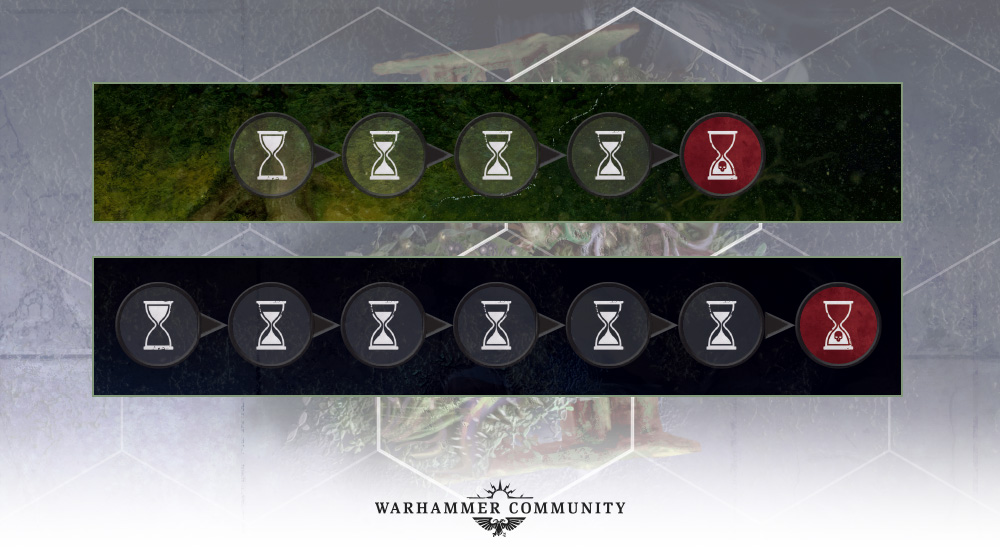
From activation dice to core abilities
We wanted to make it easier for new players to join in the games of Warhammer Quest, and to ensure that no-one would be left out of the action for too long. Enter core abilities, and a new hero character card.
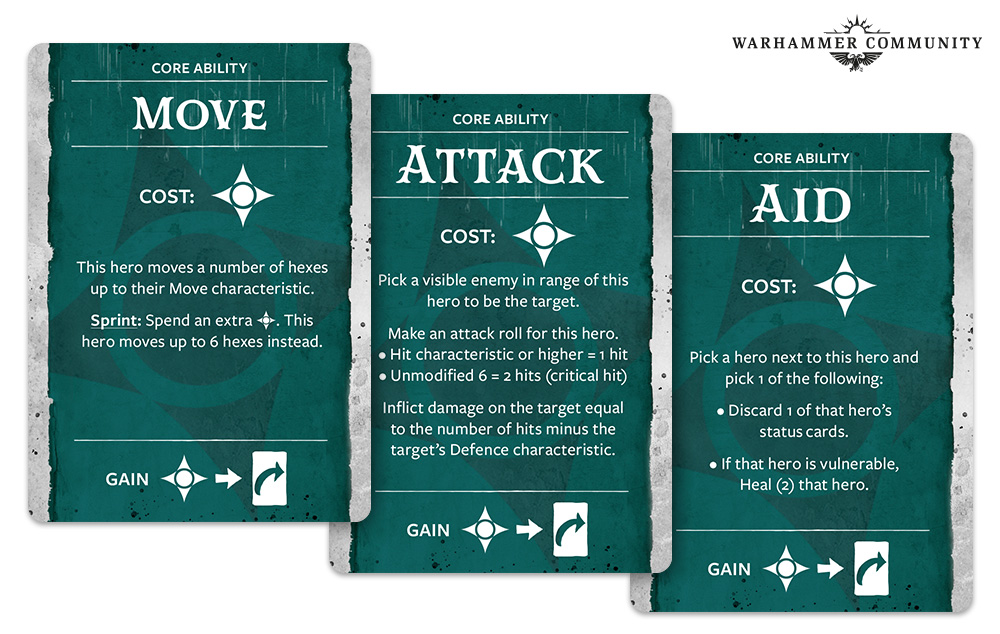
The new core abilities are the fundamental set of ‘things’ a hero can do in their turn while being the resource the abilities require at the same time. Most of your turns will be using these abilities – you’ll mostly be moving around, and hitting enemies, really hard. The order you use these in is important, of course, and there is plenty of nuance and key decisions and gambles therein, but critically, the rules for how they work and the instructions you follow are on the card itself, to get you playing really quickly.
The removal of activation dice as a health pool also allowed us to decouple those mechanics and ensure that being wounded doesn’t make your character less effective, as this could often lead to an inescapable death-spiral or a 'soft-locked' game state if a hero got an unlucky defence roll. As long as your hero isn’t at death’s door, you’ll still be capable of running around, clobbering enemies, and grabbing loot.*
Dynamic decisions
We wanted every turn in Darkwater to provide immediate and engaging decisions for players, and the core abilities provide that in spades. As an example of this, straight away most heroes need to move, and the choice between taking cheaper random movement over fixed movement is a critical one. By moving randomly (aka trudging through the sludge and hoping you don’t trip) you will probably have a very efficient turn, and a very exciting one, if things go well.
If you don’t fancy that risk you can simply Sprint – meaning you go only a little slower than the average equivalent expenditure in random movement (2D6 on average gets you 7 hexes, while Sprint moves you 6), but you have a guaranteed result meaning that when the chips are down you can do what needs to be done – fighting isn’t the only objective in Darkwater, sometimes you’ll need to finish an encounter in a specific hex, or perform other actions to win. Sprinting takes it out of anyone of course, which means your action economy is affected and you’ll be doing less – so you have to decide what price you’re willing to pay and, well, sometimes you just need to get lucky.
Same big story, but quicker!
One item to address on the agenda was how long it took to play through a full ‘quest’. We wanted to make sure that players could enjoy a full playthrough of Warhammer Quest without needing to commit to months or more to play through it – we’ve all got busy lives. Not only that, but we also wanted to give the hardcore questers out there a reason to keep coming back for more, month in, month out.
We opted for a swift, repeatable game structure with a metric ton of variety from playthrough to playthrough. This allows you to enjoy an entire playthrough of Warhammer Quest in a few evenings, or perhaps a single marathon weekend. To achieve this we’ve broken the story of Gelgus Pust’s inevitable(?) defeat into three acts. Each act is a self-contained story, with its own events, encounters, and boss fights.
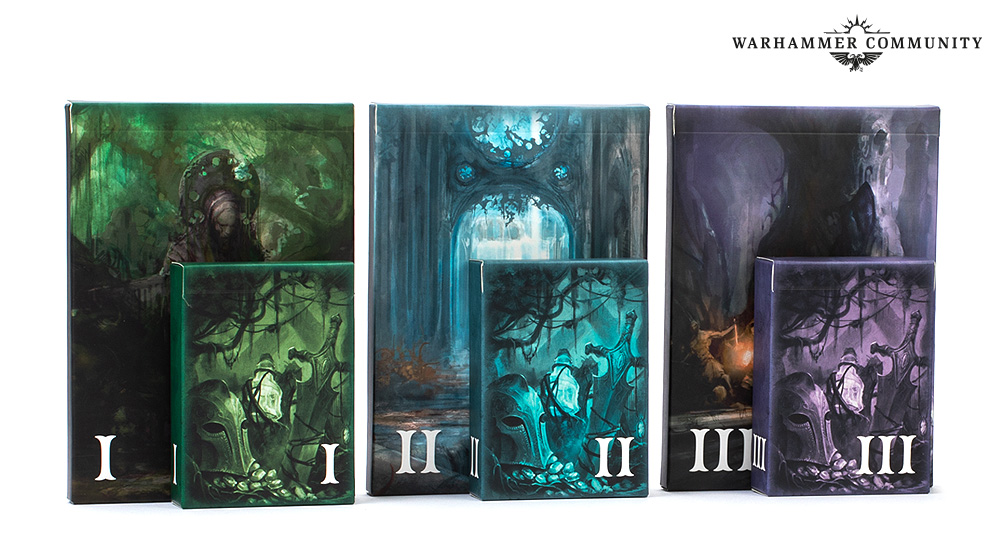
Encounters are a straight up fight with Nurgle’s minions, while events are the ‘in between’ bits – dice games, bets, trapped treasure chests, shrines to the gods, and so on. Encounters are much more risky, but provide more rewards, and events, while safer, don’t pay out as much and are resolved in a few minutes or less. This means if the end of the gaming evening is swiftly approaching, you can pick events over encounters to get to the end of the act more quickly – but you might not be best equipped to face the boss if you do. Finally there are also safe havens that the heroes can rest at, sacrificing loot and scavengers' rights in favour of a nice breather, and the chance to swap loot around before carrying on. A well timed rest can mean the difference between success and failure, but in the Jade Abbey, those are few and far between.**
…and we go again!
As you play through the game you’ll unlock rewards and new heroes for future playthroughs. Set items, alternative rules for heroes, and even a secret encounter await, giving you tonnes of fun across multiple tries. Not only that, but since you’ll see only a fraction of the available cards for each act and boss on each run, you’ll be discovering new abilities, events, and encounters as you play, leading to an endlessly replayable game you can enjoy time and again.
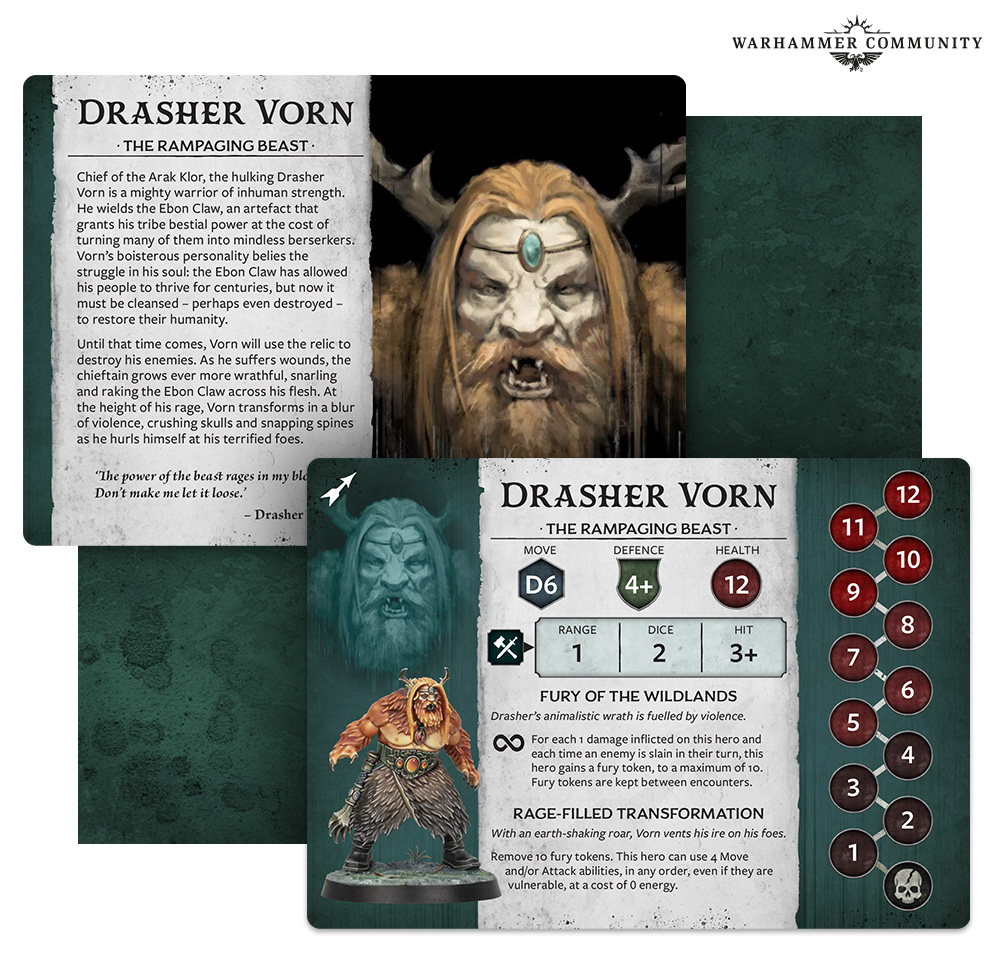
The quicker playthrough also means that losses don’t feel punishing. Anyone familiar with the ‘try that one again shall we?’ question from a fellow adventurer after a nasty defeat? Well if you are, Darkwater has two ways to resolve the occasional but dismal defeat.
If you’re playing a campaign, you can just bin off some rewards and try again. The game even provides some healing to make sure your second try isn’t as doomed as your first was. If you’re playing a skirmish, well, you can just try again can’t you! ‘What’s a skirmish?’ you ask…?
One and done – the skirmish
If you want to simply play a quick game of Warhammer Quest on a cold winter’s evening, you just draw an encounter card at random from any act, give players a set of random rewards to kit them out for the adventure to come, and then have a bash at beating that encounter. There’s even a points system to track how well you’ve done, enabling you to have another go (maybe with different rewards) and to try and do better. This means you have a way of enticing players into a full campaign – after all, if they enjoy the skirmish, then why not stick around for another go?
Sweet loot
No article about Warhammer Quest would be complete without referencing the loot, treasure, and swag you can swipe from defeated foes. In Darkwater, these are referred to as rewards, and boy howdy, are they important.
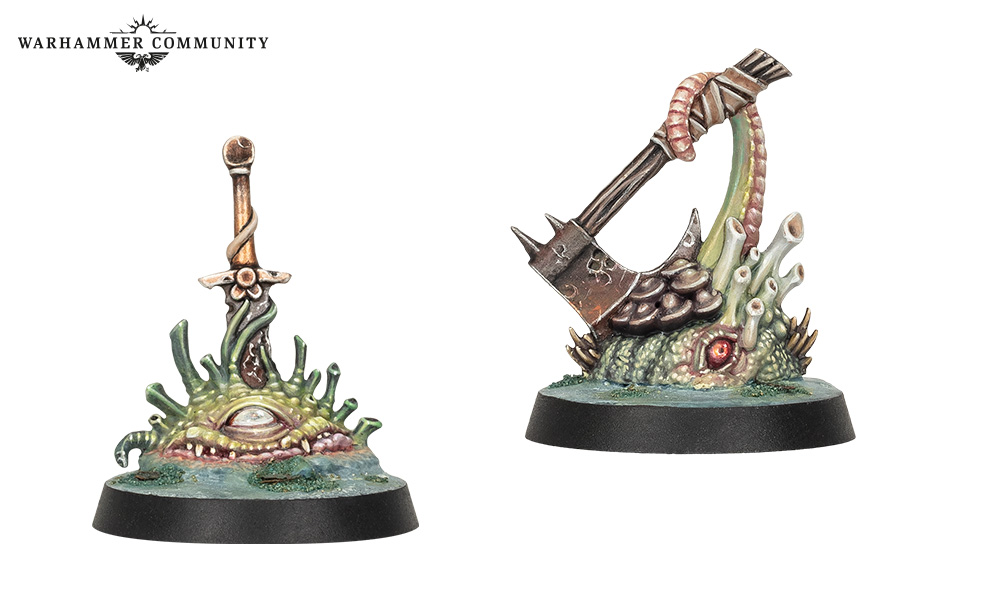
Everyone likes treasure, and heroes are no different. In Warhammer Quest: Darkwater, rewards are dished out after every encounter and some events. Encounters, being generally more risky, provide more choice, but each player is generally limited to gaining just one reward at a time. This is done deliberately to ensure a gradual scaling of complexity throughout the run, meaning new players can keep up with new abilities. Learning rules one new card at a time is nice and relaxed, and a cap of four rewards means there’s never too much to remember.
As for the rewards themselves, well, there are hundreds of unique rewards. Each has different rarities, to let anyone know at a glance the rough power levels of the rewards, and they all provide something a little different to the hero in question. There are some duplicates, like the common, but ever-useful, Sip of Aqua Ghyranis or a Blackpowder Grenade, all the way up to the Crooked Dice, a fine way to finish off an enemy in a flash, or pass a vital save roll.
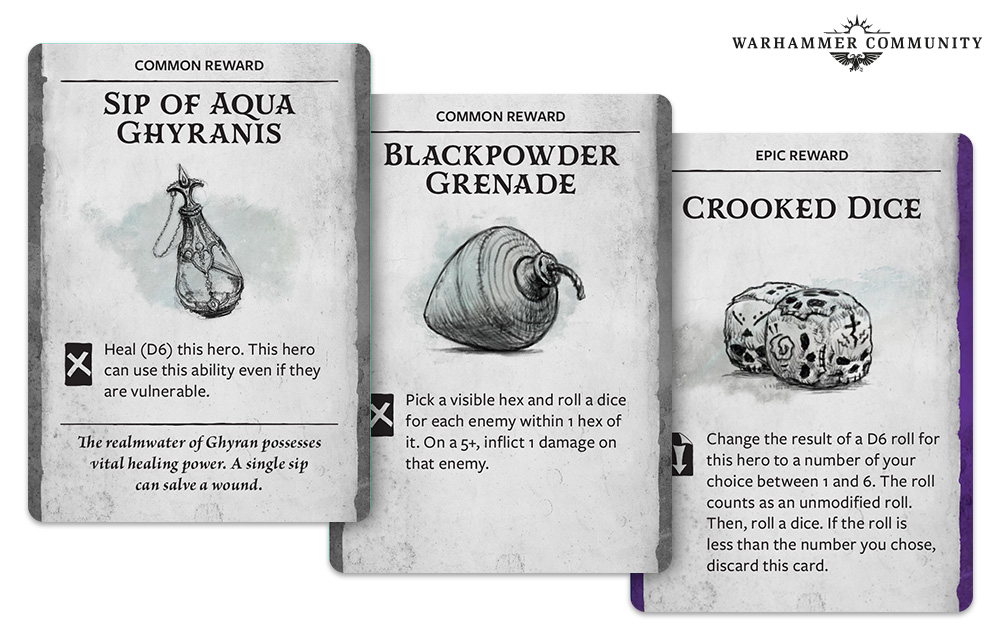
As you play you’ll also discover some pretty gnarly combos, and even unlock ‘set items’ for your heroes – a grouping of rewards that, if you combine all three on the correct hero, provide a powerful additional effect. Between those and the variety of heroes on offer, no two playthroughs of Darkwater will ever be the same, as you combine different rewards with different heroes and encounters into a rich tapestry of experience.
There’s much more that I could cover here, including enemy action queue design, special actions that give enemies more defined threats for the heroes to deal with (you’ll never forget when a Mire Kelpie Retches on you), boss enemies and their power-up action queues, alternative hero design, map design, unique encounters on the same map in every act, enemy action dice, overall game difficulty, and even more. Of course, I wouldn’t want to take away all the surprises, and the very best way to discover all this is to play the game!
Many thanks to John for this fantastic overview of the decisions behind the new mechanics. We can’t wait to get stuck into the Jade Abbey, face the Plague God’s minions, and grab some shiny treasures – and we’re sure you feel the same. Fortunately for us all, Warhammer Quest: Darkwater will be on pre-order from Saturday.
* You can find out more about actions, health, and more in our rules-focused adventurer’s guide article.
** What do you know? We have another adventurer’s guide focusing on encounters and the campaign, packed with more details.


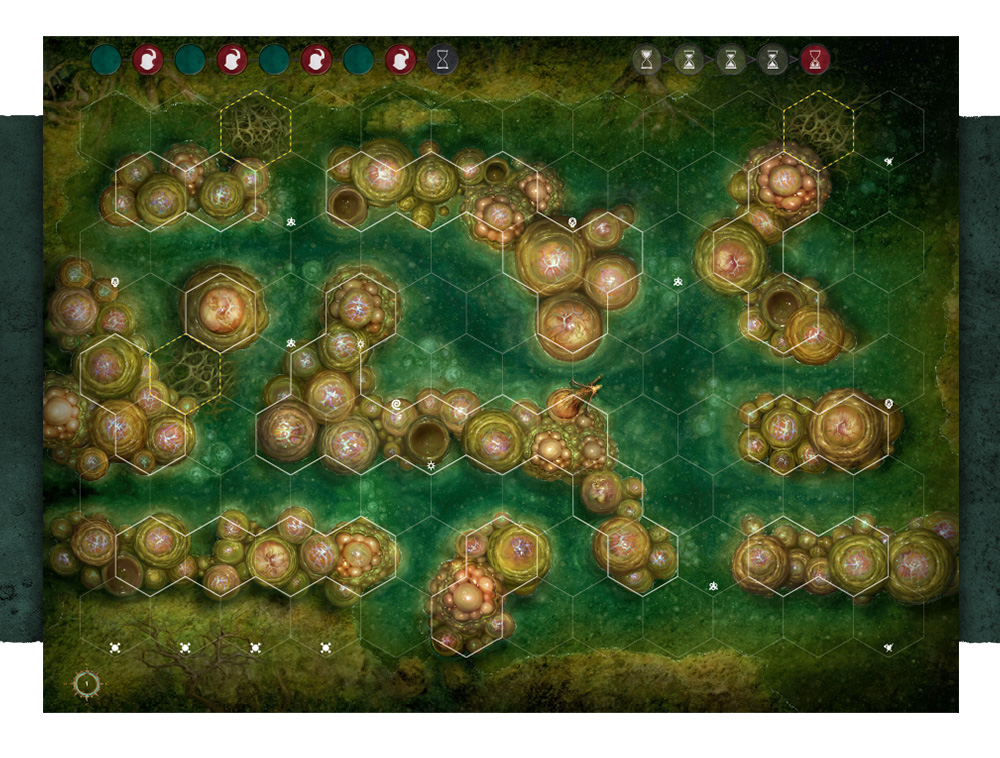
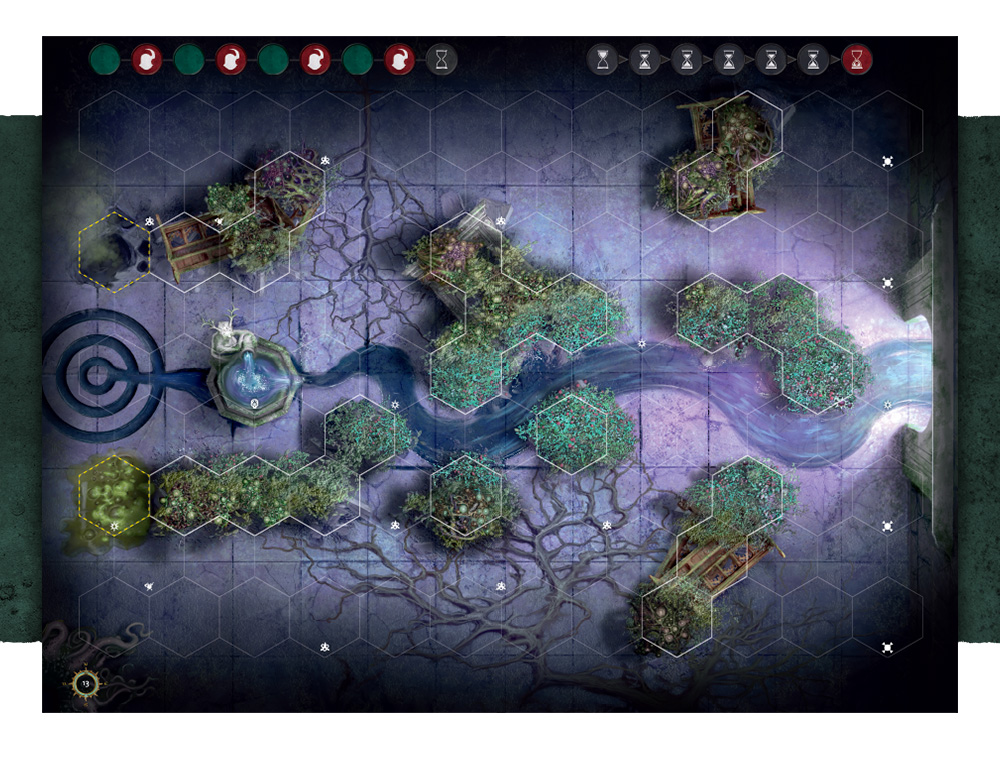
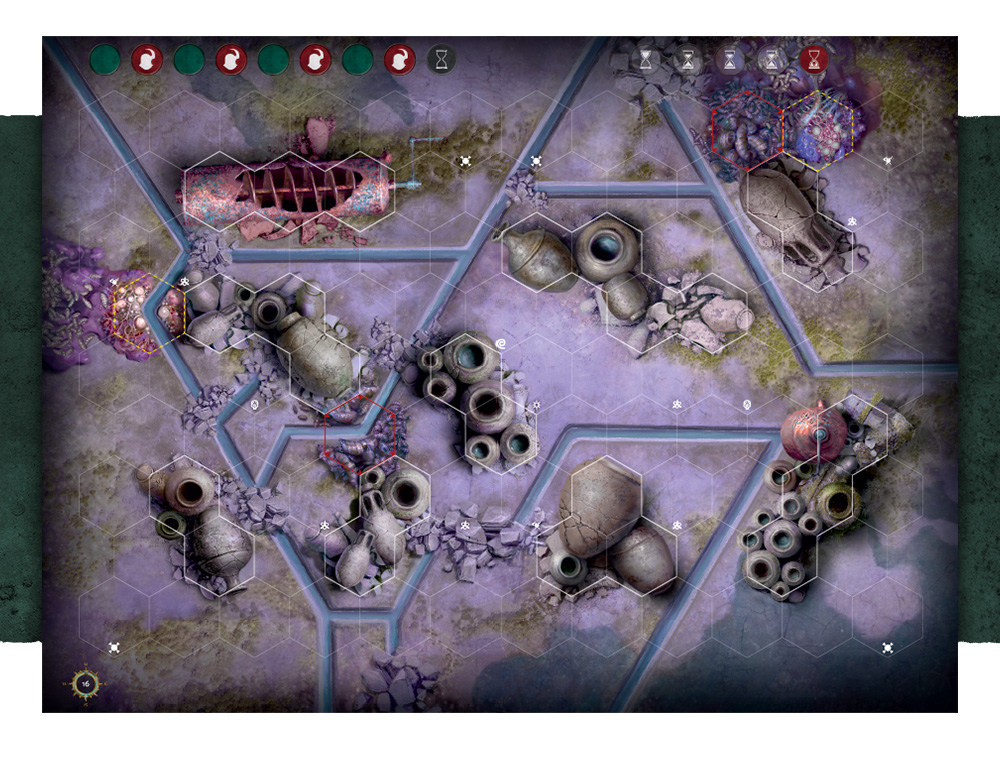
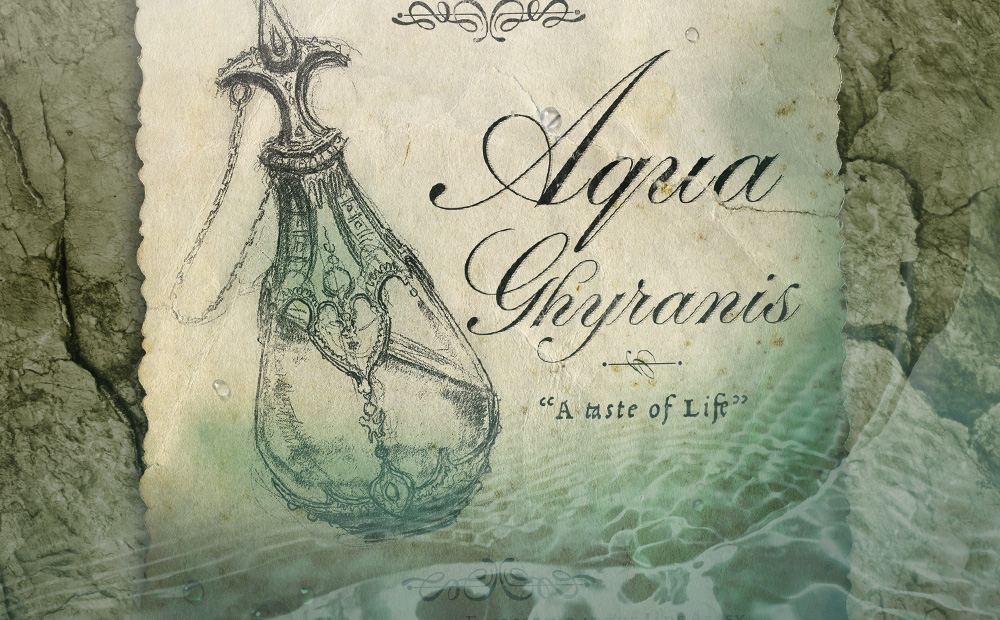
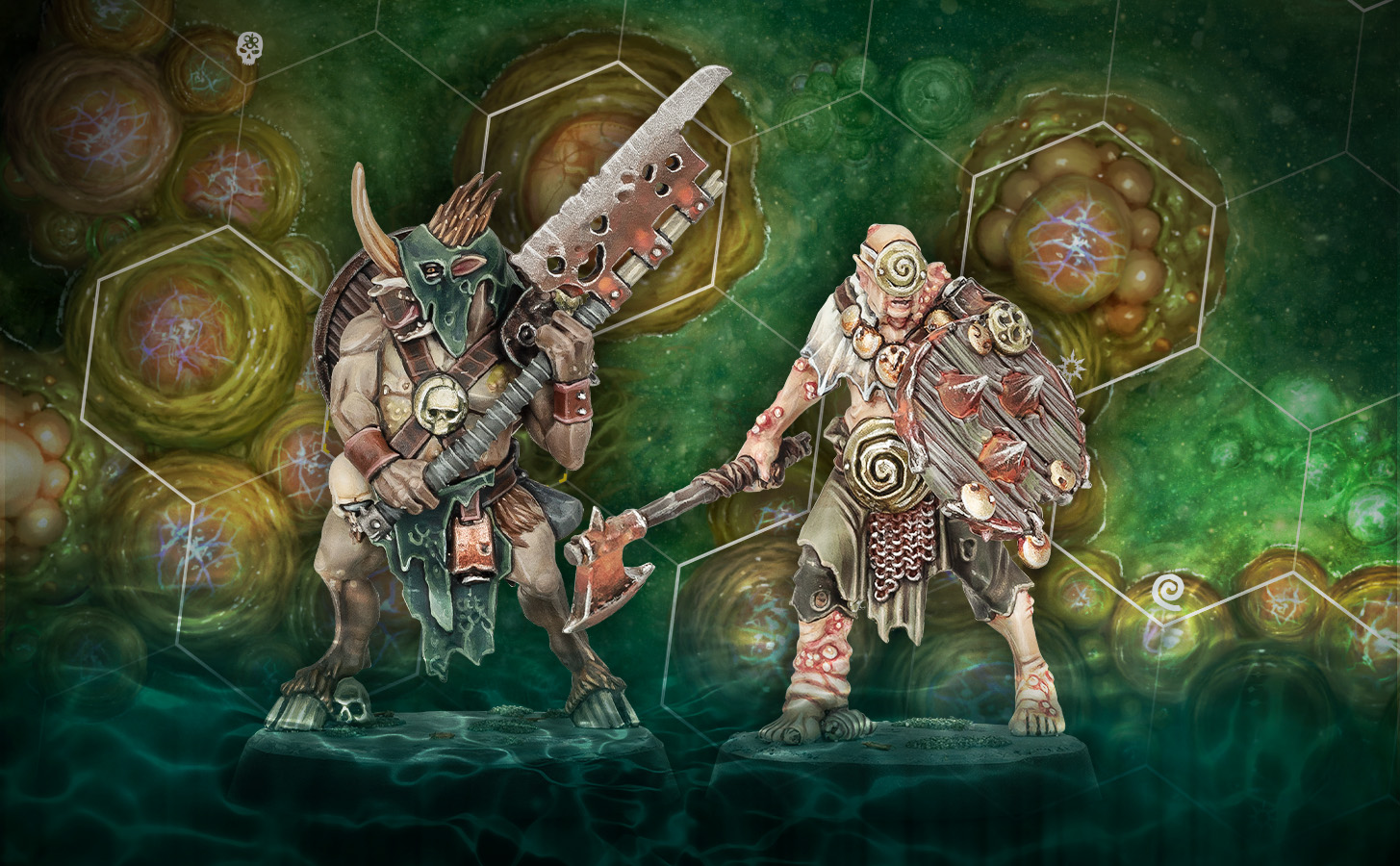
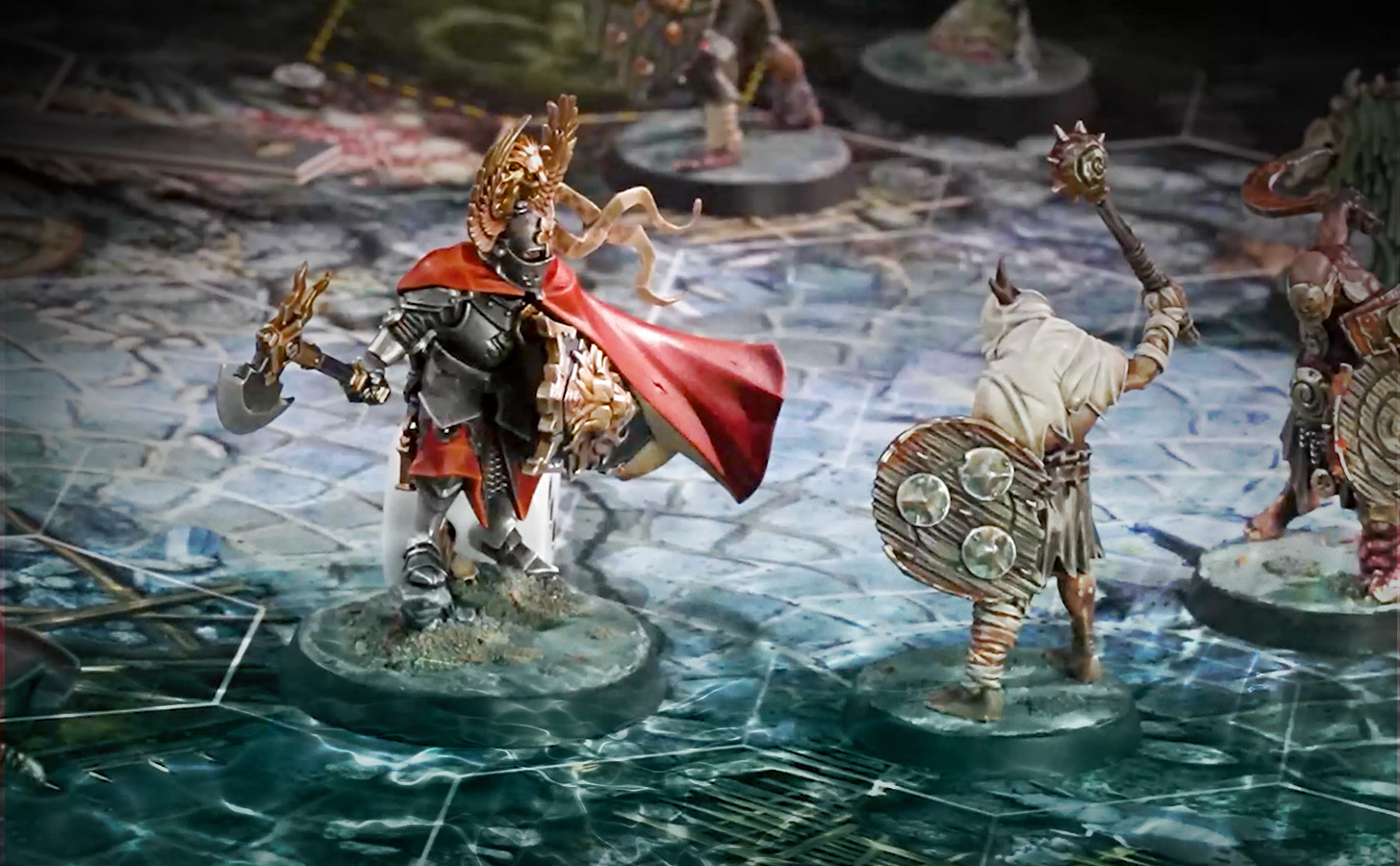
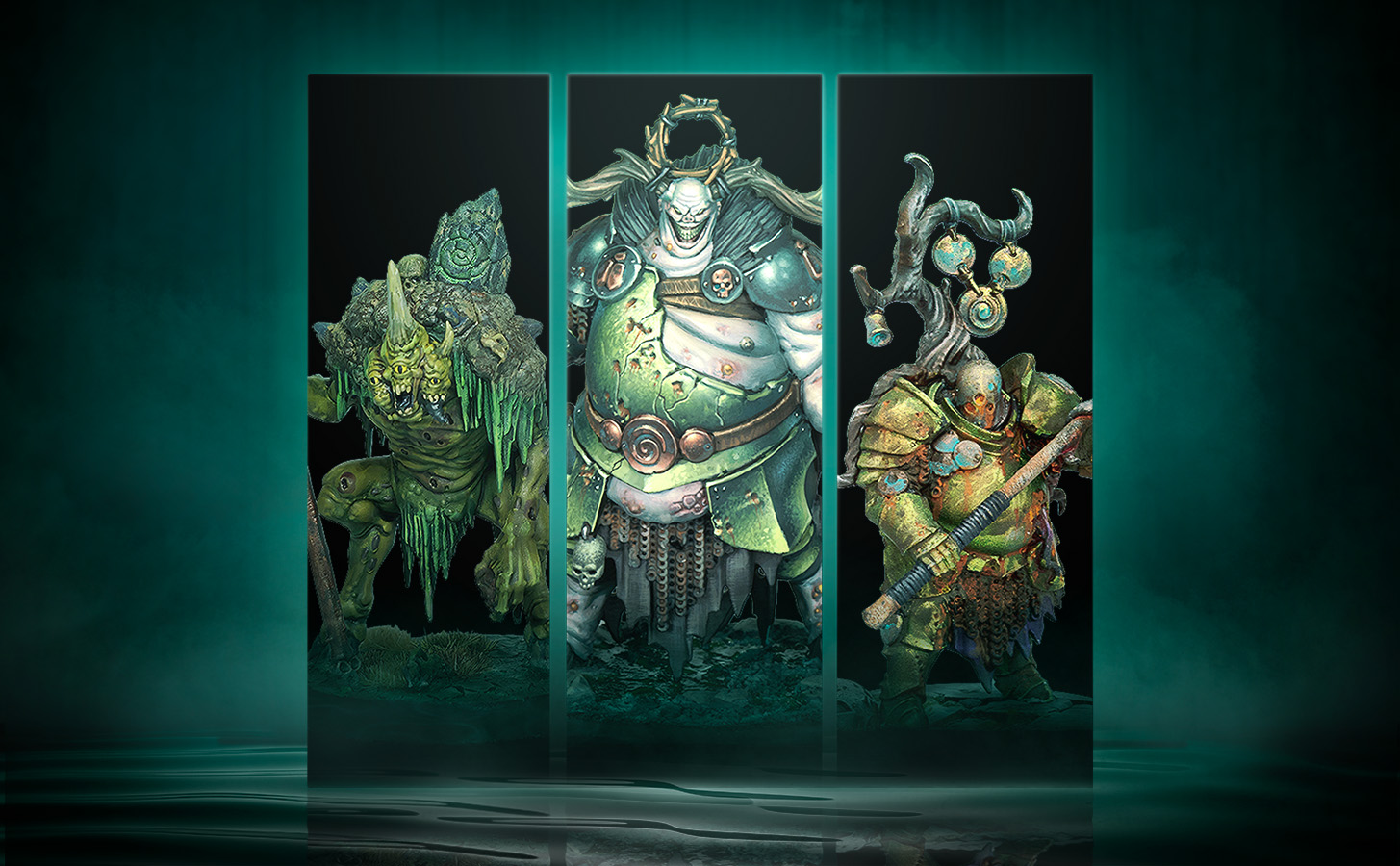


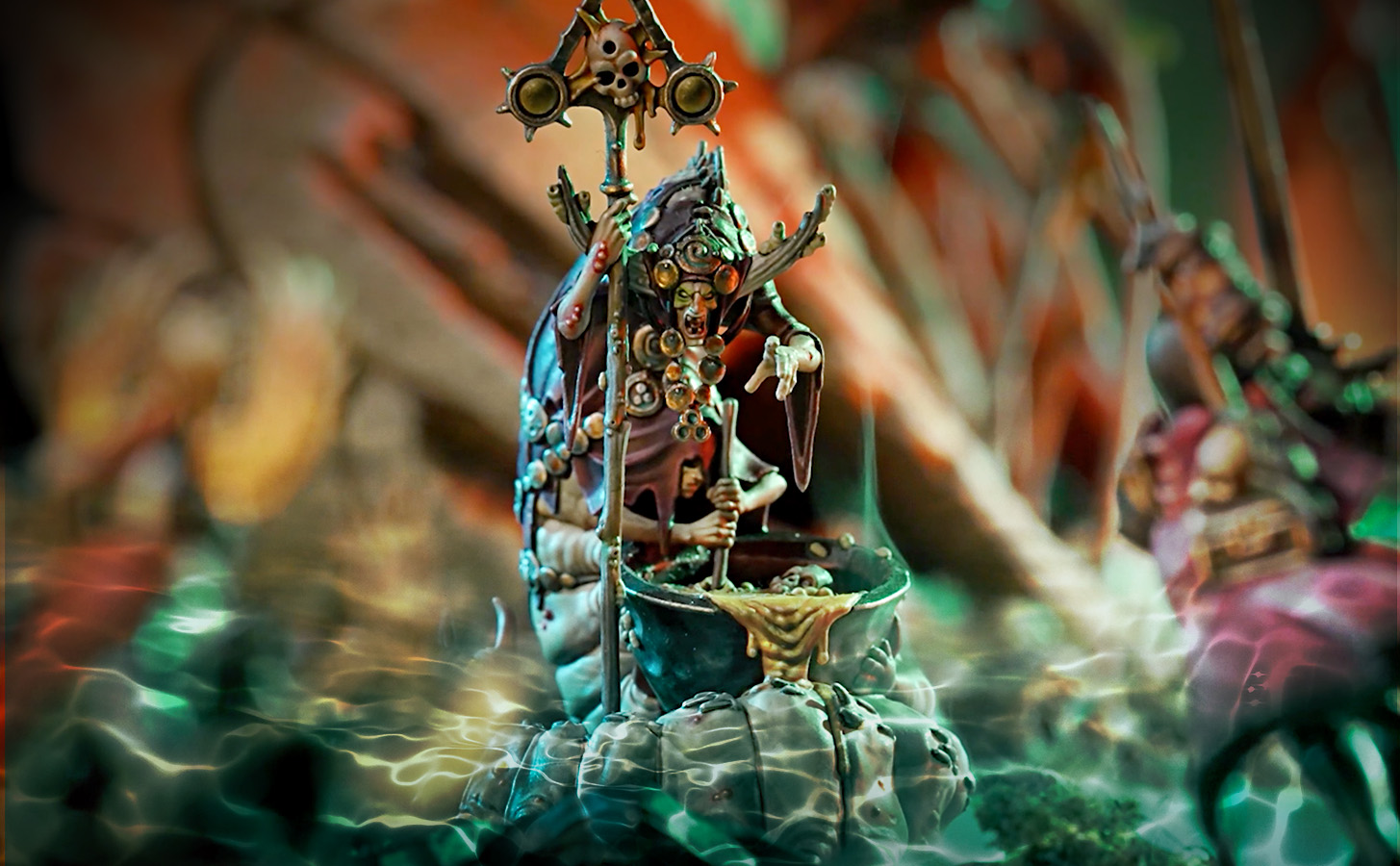
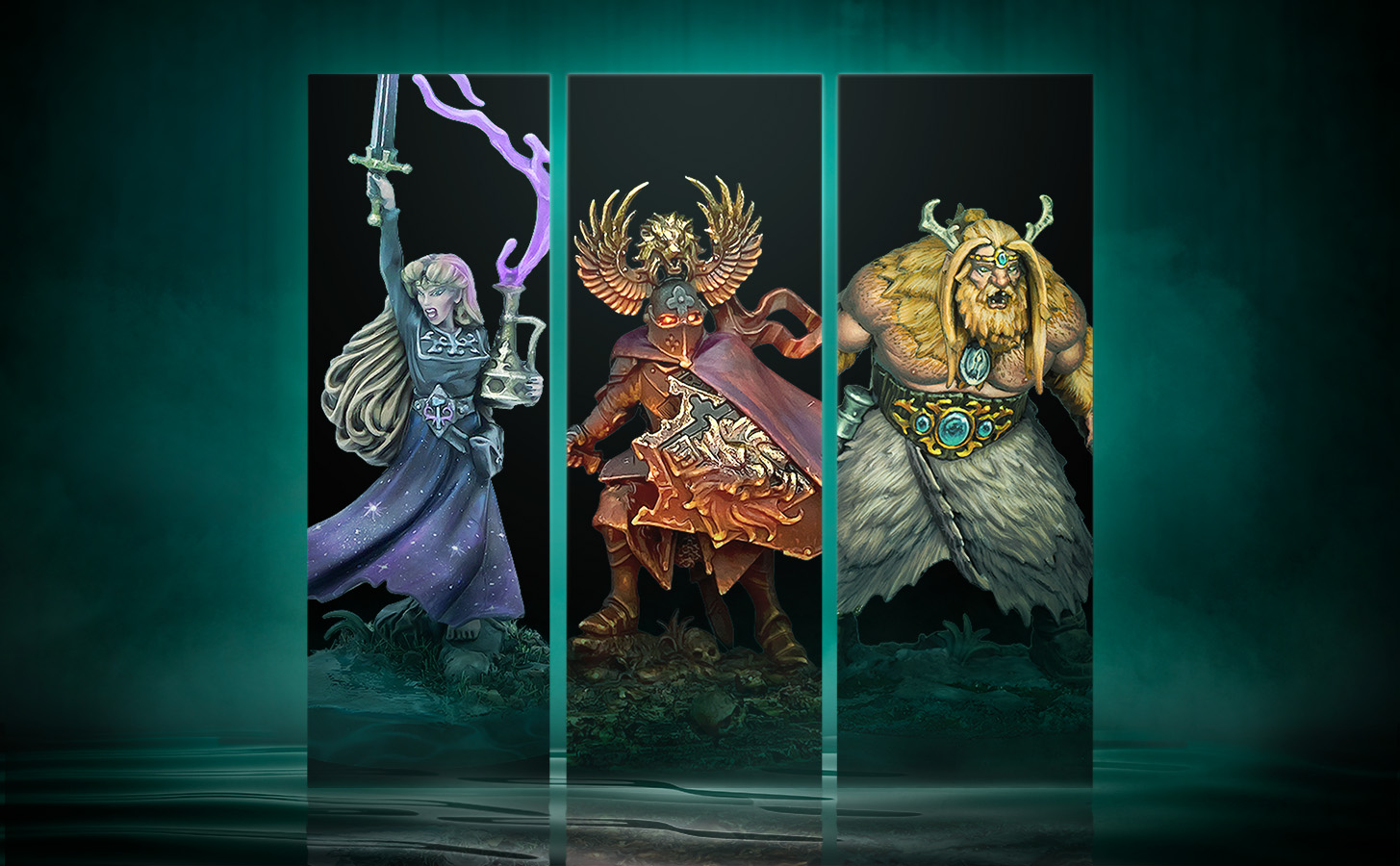
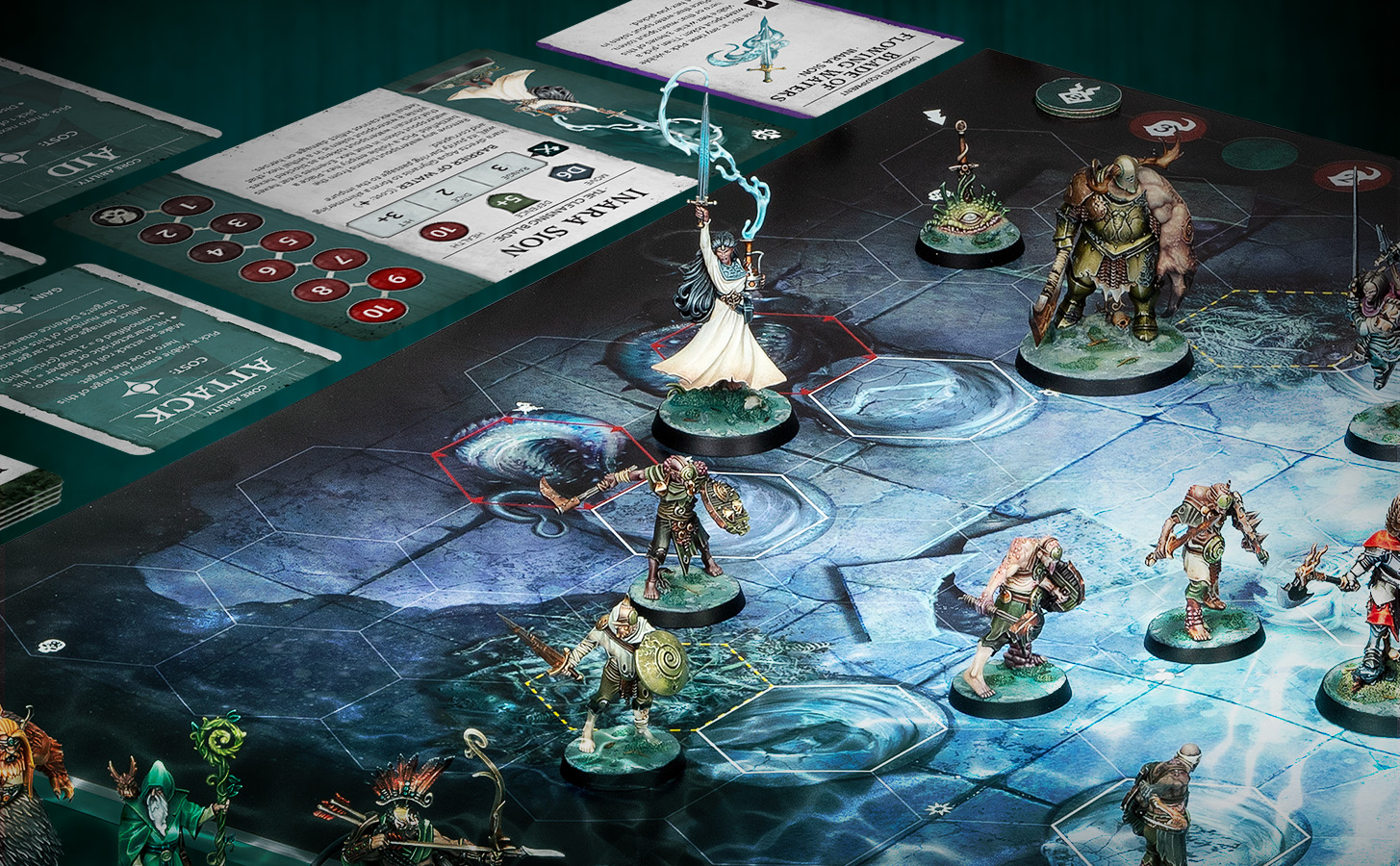
-g7kobk80zo.jpg)